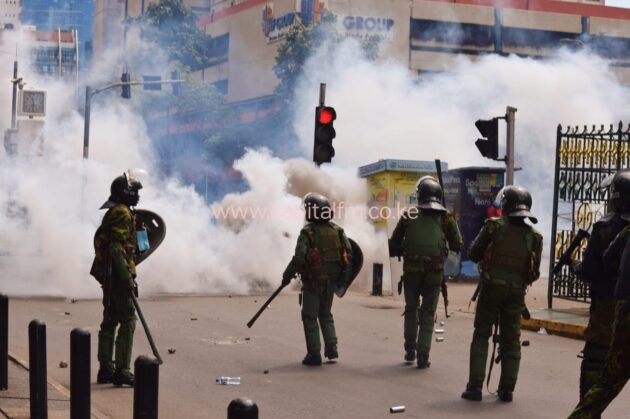
Enough is enough, President Ruto declares, vowing to end protests » Capital News
NAIROBI, Kenya, July 20 – President William Ruto has declared “enough is enough” after weeks of protests that have claimed over 50 lives across the country.
Speaking in Bomet County, Ruto emphasized that he has given ample concessions to the “leaderless” protests by Gen Z, and any further continuation will only serve to disrupt the nation’s fabric.
“I have said going forward, I will protect the nation,” he stated, addressing a roadside gathering after attending a church service. “
Last week, President Ruto accused Ford Foundation of sponsoring the protests in Kenya through some civil society organisations but the American NGO has dismissed the claim.
And even as the president vowed to spoke the protests, the Gen Z movement has already released plans for more protests starting Tuesday this week.
However, Ruto has vowed that they will not proceed. “I want to promise it is going to stop. Enough is enough,” he said after unveiling a new Cabinet of eleven members, retaining six from the previous Cabinet he dissolved a week ago.
“We will protect life, we will protect property, we will stop the looters, we will stop the killers, we will stop the mayhem, we will stop anarchy because Kenya is a democracy and we want a peaceful, stable nation. Our issues are resolved using democratic means,” the president said.
This decision to retain some of the Cabinet Secretaries has angered the Gen Z protesters, who accuse him of recycling the old guard they want out of power.
The demonstrations initially started as protest against the Finance Bill in June which the president eventually shelved after protesters stormed Parliament on June 25 when it was passed.
“They said we should not pass the Finance Bill, and I dropped it. Then I called them, and they said they didn’t want to come for talks with me. They told me to go to X [spaces], and I went there, but they ran away,” the president said, adding “Then they told me to call for a national dialogue, I have called for dialogue, and now they have refused. They are still saying they are faceless, formless. I have given everyone a chance to say whatever they want. I cannot continue like this. The country is much more important than any group of people. We must come together as a nation, protect our nation, and ensure that Kenya is a democracy. Anyone who has issues should use the front door and tell Kenyans what they want.”
Azimio leader Raila Odinga on Sunday laid out a six-point action plan that the government must address before he will engage in any discussions with President William Ruto. The latest demands come as Raila faces mounting pressure from some of his allies and Kenyans to boycott the talks with President Ruto.
President Ruto initiated the talks, which Raila had agreed to but later rejected, citing the demands of the youth—specifically Generation Z—who continue to mobilize anti-government protests.
Key items on the actionable plan include compensating victims of police brutality, dismissing all protest-related cases, releasing all abductees and prisoners, and addressing unresolved issues in healthcare (specifically for healthcare workers) and education (especially for JSS teachers).
Additionally, the plan advocates for returning public healthcare insurance to the National Health Insurance Fund (NHIF), eliminating the Social Health Insurance Fund (SHIF), and prosecuting all security sector individuals involved in atrocities against peaceful Kenyans. “Once these issues are resolved, we can focus on a National Conversation, and conduct it transparently in a neutral venue,” Raila said.
President Ruto had on July 9, 2024, announced a multi-sectoral national conference aimed at addressing the nationwide protests that have resulted in loss of life and widespread property damage.
Despite accusations of opportunism from some quarters, Raila underscored the importance of including diverse stakeholders in the discussions. “It is my proposal that representatives for this convention should come from various sectors including youth, government, religious leaders, healthcare professionals, lawyers, and teachers,” he said.
